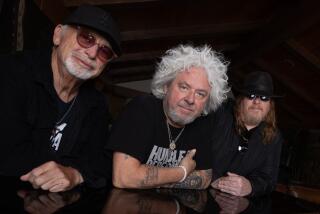The Real Obscenity Was the Oath : Court concurs with Newport Harbor Art Museum and Bella Lewitzky Dance Company
In compelling language, a federal judge has ruled unconstitutional the attempt by the National Endowment for the Arts to require recipients to pledge, before receiving grants, not to create or show obscene works. That’s welcome news in a new year, especially since freedom of expression seemed to have its back to the wall for so much of 1990.
U.S. District Judge John G. Davies said the NEA requirement was unconstitutionally vague. He also explained just how chilling such a pledge would be on creativity. He noted that, because of the NEA’s extensive role in financing the arts and the fact that certain private funding follows NEA grants, artists not signing an oath might be worse off than if they had not applied for an NEA grant at all. That, he said eloquently, is “the type of obstacle in the path of the exercise of fundamental speech rights that the Constitution will not tolerate.”
The ruling was anti-climactic, since the NEA, under pressure from Congress, dropped the requirement from its 1991 application process. But it gives important legal backing to arts groups who feared that the anti-obscenity requirement would intrude on artistic freedom--one of the underpinnings of freedom of expression.
The decision came in separate but identical cases brought by the Newport Harbor Art Museum in Newport Beach and the renowned Bella Lewitzky Dance Company in Los Angeles, with supporting arguments from prestigious artists and groups. The ruling should help head off future attempts to impose such restrictions.
Last year’s NEA debacle was spurred in part by congressional conservatives’ reaction to an exhibit of sexually explicit works by photographer Robert Mapplethorpe. NEA Chairman John E. Frohnmayer unilaterally decided to require artists and arts groups to certify, before receiving money, that they wouldn’t create or show “obscene” works. The problem was--and remains--how to determine what exactly is obscene. And the question of who gets to decide is equally important.
The U.S. Supreme Court has grappled with these thorny problems for decades, determining that obscenity can be determined only within the context of individual community standards. That, as Davies so clearly outlined, isn’t for the NEA to decide.
The esteemed constitutional lawyer Floyd Abrams put the NEA fight in proper perspective. The decision, he said, should finally lay to rest a constitutional confrontation that should never have happened in the first place.
More to Read
The biggest entertainment stories
Get our big stories about Hollywood, film, television, music, arts, culture and more right in your inbox as soon as they publish.
You may occasionally receive promotional content from the Los Angeles Times.






